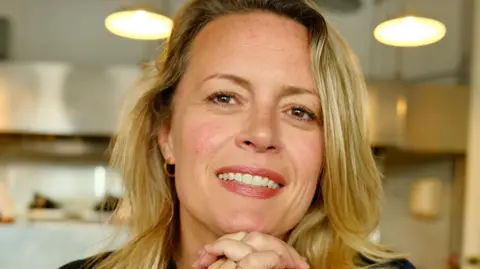
 Sophie Jones
Sophie Jones
“Get out of your comfort zone.” “Take no for an answer.” “Do something every day that makes you feel uncomfortable.”
If you’ve spent any time on social media you’ll be used to seeing these motivational memes.
And you might have been seeing more recently thanks to the “rejection therapy” trend.
The most basic version involves pushing yourself to make a silly request or ask a question that’s almost certain to get turned down.
Do it enough times, the theory goes, and you’ll desensitise yourself to rejection and boost your confidence.
Others take it further, performing wacky, harmless stunts that will attract attention – and possible judgement from strangers – in public.
While it’s not an officially recognised form of therapy, some people will tell you it’s changed their lives.
But, professionals tell BBC Newsbeat, it’s not for everyone.
One person who swears by rejection therapy is Sophie Jones.
The 22-year-old from Warrington says she was inspired to try it because she was always scared to speak up at work or make plans with friends.
She says she quickly learned that you might not always get the response you expect.
“I’ve realised that people do not like to reject other people,” she says.
“It is very rare that I’ve got a straight-up ‘no’ from somebody – I always get an awkward laugh or, like, a ‘why?’.”
Sophie actually jumped in at the deep end when she first tried rejection therapy in May this year.
Allow TikTok content?
This article contains content provided by
TikTok
. We ask for your permission before anything is loaded, as they may be using cookies and other technologies. You may want to read
and
before accepting. To view this content choose
‘accept and continue’.
She filmed herself dancing in a public park – something that would normally have terrified her.
As her comfort zone quickly expanded she began to care less about what others thought of her.
“Within three days I started to feel less judgement from people,” she says.
“My whole mindset has changed.”
Sophie now regularly posts videos on TikTok of her challenging herself in increasingly eye-catching ways.
That’s included painting herself green and walking around busy areas, and her most popular upload, where she stands in the middle of an aeroplane and loudly tells the other passengers to “have a good flight”, got 16 million views.
The awkward silence afterwards would once have mortified her, but not any more.
“I just really don’t stay up at night thinking about what the people think about me any more, which is obviously really lovely,” says Sophie.
Rejection therapy: What do doctors say?

 Dr Louise Goddard-Crawley
Dr Louise Goddard-Crawley
Dr Louise Goddard-Crawley is a psychologist specialising in attachment and relationships.
She says she’s cautious about rejection therapy.
“I understand the idea of intentionally seeking out rejection to lose the fear of it,” she says.
“It can help to build resilience. But it doesn’t necessarily mean it will lessen the sting of the rejection.
“It could have the opposite effect and make you retreat a little bit more into that comfort zone.”
Clinical psychologist Dr Jake Easto points out that there isn’t any published scientific research to show rejection therapy actually helps people.
He’d call it a self-help technique instead.
But, he says, the basic theories behind it seem “quite sound” and he can understand the appeal of it.
“I think ‘rejection therapy’ has been able to package some well-established techniques in a new and fun package,” he says.
“As a self-help technique I think it could definitely help people and encourage people to make positive changes.”
However, rejection therapy isn’t tailored to individuals in the same way as more established methods with good evidence behind them, he says.
Dr Easto says cognitive behavioural therapy (CBT), for example, is often used for treating disorders including PTSD, OCD and anxiety in a more targeted way.
“The tasks in rejection therapy need to be a bit more generalised, due to being targeted at a mass audience,” he says.
Sophie is convinced that rejection therapy has helped her, and says she gets contacted frequently by people who’ve been inspired to try it.
“People saying they’ve not gone out in months and they’ve gone for a little walk around the park because of me fills me with absolute joy, because that was honestly one of the things I was apprehensive about,” she says.
“The amount of people that have said they’re inspired by it is very heartwarming and is fulfilling.”
Dr Goddard-Crawley says that anyone with more severe social anxiety should seek deeper, personal therapy to work out where it comes from.
She’s seen progress in people taking on rejection therapy, but says you also need to understand where the fear of rejection comes from.
She says that if you’re told “no” you should understand it’s about the other person’s circumstances and not your own worth.
“If you’re rejected, you’ll survive, you’ll be okay.”


Listen to Newsbeat live at 12:45 and 17:45 weekdays – or listen back here.








